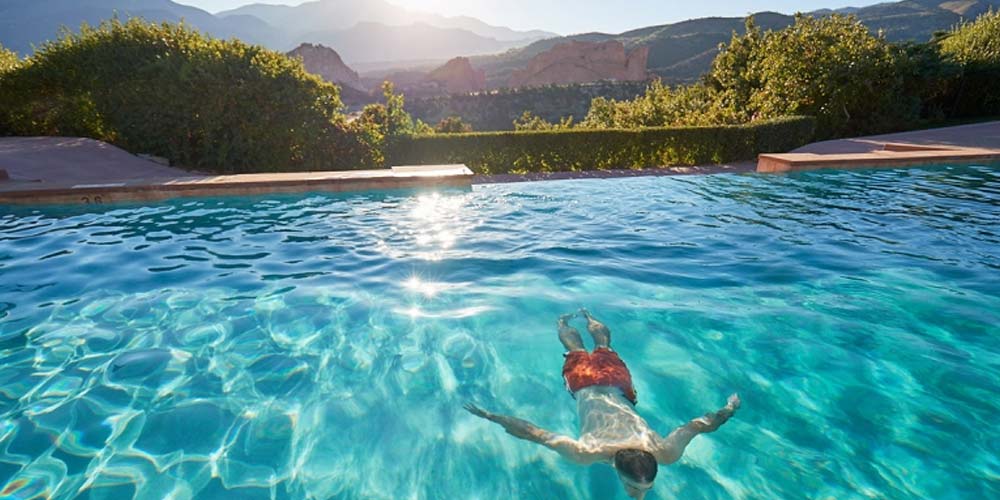Ҳеҷ чиз аз ҷаҳидан ба ҳавз дар рӯзи гарми тобистон беҳтар нест. Ва азбаски ба ҳавзи шумо хлор илова карда мешавад, одатан шумо набояд дар бораи он ки оё дар об бактерияҳо мавҷуданд ё не, хавотир шавед. Хлор бактерияҳоро дар об мекушад ва аз афзоиши обсабзҳо пешгирӣ мекунад.Дезинфексияҳои хлорӣбо роҳи ҳал кардани кислотаи гипохлории маҳсулот дар об кор кунед. Ҳам нури офтоб (UV) ва ҳам гармӣ метавонанд ба сатҳи хлори мавҷуда дар ҳавзи шумо таъсир расонанд, ки ин ба муддати кори дезинфексиякунанда таъсир мерасонад.
Таъсири нури офтоб (UV) бадезинфексияҳои хлори ҳавз
Нури офтоб, бахусус ҷузъи ултрабунафши он, омили асосии устувории хлор дар оби ҳавз мебошад. Хусусан дар ҳавзҳои беруна, нурҳои ултрабунафш хлори озодро дар ҳавз вайрон мекунанд ва консентратсияи умумии хлорро коҳиш медиҳанд. Ин раванд пайваста аст, яъне хлор дар давоми рӯз истеъмол мешавад.
Барои кам кардани таъсири нури офтоб ба сатҳи хлор, соҳибони ҳавзҳо аксар вақт кислотаи сианурӣ (CYA)-ро истифода мебаранд, ки онро стабилизатор ё кондитсионери хлор низ меноманд. CYA талафоти хлори озодро дар ҳавз кам мекунад. Аммо, нигоҳ доштани консентратсияи дурусти CYA муҳим аст, зеро агар кислотаи сианурӣ аз ҳад зиёд бошад, он "хлорро маҳкам мекунад" ва ба таъсири безараргардонӣ таъсир мерасонад. Диапазони тавсияшудаи CYA дар оби ҳавз одатан аз 30 то 100 ppm аст.
Таъсири ҳарорат
Дар ҳавои гарм, махсусан дар ҳавзҳои беруна, бо баланд шудани ҳарорат, таҷзия ва бухоршавии хлори муассир суръат мегирад ва бо ин миқдори кислотаи гипохлориро дар об кам мекунад ва ба таъсири безараргардонӣ таъсир мерасонад.
Ҳар қадар ҳаво гармтар ва офтобӣ бошад, ҳамон қадар хлор бештар истифода мешавад. Аммо, ҳар қадар ҳаво гармтар ва офтобӣ бошад, ҳамон қадар бештар аз ҳавзи худ лаззат бурдан мехоҳед! Албатта, шумо бояд. Аммо ҳамон тавре ки он дар рӯзи гарми тобистон ба шумо як воҳаи хунук медиҳад, шумо бояд аз оби ҳавзи худ низ эҳтиёткор бошед.
Дар рӯзҳои гарм ё офтобӣ, шумо бояд ба миқдори хлори мавҷуда дар ҳавзи худ диққати бештар диҳед, то боварӣ ҳосил кунед, ки дезинфексиякунандаи хлор метавонад оби шуморо барои шумо самаранок ва дарозмуддат тоза ва бехатар нигоҳ дорад. Санҷиши худро анҷом диҳед.химияи ҳавзсатҳҳоро сари вақт тафтиш кунед, то боварӣ ҳосил кунед, ки ҳавзи шумо тоза ва солим аст. Мутахассисони ҳавз тавсия медиҳанд, ки сатҳи хлори озоди худро ҳадди аққал як маротиба дар 1-2 рӯз санҷед.
Тавре ки қаблан қайд кардем, нигоҳ доштани сатҳи хлори озод дар сатҳи кории солим муҳим аст, то ки он бо зарраҳои зараровар дар оби ҳавзи шумо мубориза барад. Ин ҳолат ҳангоми ҷаҳидан ба об боз ҳам шадидтар мешавад. Сабаби дигари он аст, ки барои санҷидан ва нигоҳ доштани сатҳи хлори солим бодиққат бошед, то ҳама чиз ва ҳама тоза ва бехатар бошанд.
Вақти нашр: 05 июли соли 2024


